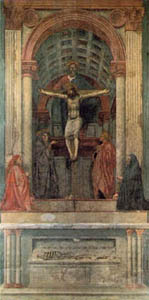"The Church begins its reign now, with Christ, in the living and the dead"
------------------------------------------
"While the devil is bound, the saints reign with Christ during the time between His first and second coming. For the Church could not now be called His kingdom or "the kingdom of heaven" unless His saints were even now reigning with Him; for to His saints He says, "I am with you always, to the close of the age" (Mt 28:20). Surely it is in this present time that the scribe trained for the kingdom of God brings forth from his treausre things new and old (see Mt 13:52). And it is from the Church that the reapers shall gather the tares that He allowed to grow alongside the wheat until the harvest, as He explains: "The harvest is the close of the age, and the reapers are angels, and they will gather out of His kingdom all causes of sin and all evildoers" (Mt 13:39-41). Can He mean that they are gathered out of the future kingdom in which there are no offenses? Of course not. Then they must be gathered out of His present kingdom, the Church.
We must understand, on the one hand, the kingdom of heaven in which those who break His teaching coexist with those who do His teaching. The one is the least, and the other the great. On the other hand, we must also understand the kingdom of heaven into which only the doer of Christ's teaching shall enter. Where both classes exist, it is the Church as it now is. But where only the one shall exist, it is the Church as it is destined to be, when no wicked person shall remain in her.
So the Church even now is the kingdom of Christ and the kingdom of heaven. Even now His saints reign with Him, though in a different way than they will reign in the hereafter. And, though the tares grow alongside the wheat in the Church, they do not reign with Him. For those who reign with Him are those who do as the apostle says: "If then you have been raised with Christ, seek the things that are above where Christ is, seated at the right hand of God. Set your minds on things that are above, not on things that are on earth" (Col 3:1-2). Of such people he also says that their "commonwealth is in heaven" (Phi 3:20). In short, they reign with Him who are so in His kingdom that they themselves are His kingdom.
But what about those who are in it until all evildoers are gathered out at the end of the world? What about those who seek their own things, and not the things that are Christ's? In what sense are they the kingdom of Christ?
We all live in this kingdom militant -- amid conflict with the enemy, waging war against our rebellious desires, and governing them as they yield -- until we come to that most peaceful kingdom where we shall reign without an enemy. And it is of this first resurrection, in the present life, that the Book of Revelation speaks when it says that the devil is bound a thousand years and is afterward loosed for a short season (see Rev 20:2-6). It goes on to sketch out what the Church does, and what is done in the Church, in those days: "Then I saw thrones, and seated on them were those to whom judgment was committed" (Rev 20:4). Don't think that this refers to the last judgment. It refers, rather, to the rulers by whom the Church is now governed and the thrones from which they rule. And no better interpretation of judgment being given can be produced than the words, "Whatever you bind on earth shall be bound in heaven, and whatever you loose on earth shall be loosed in heaven" (Mt 18:18). So the apostle says, "For what have I to do with judging outsiders? Is it not those inside the Church whom you are to judge?" (1 Cor 5:12).
And, says John, "the souls of those who had been beheaded for their testimony to Jesus and for the word of God... reigned with Christ a thousand years" (Rev 20:4). These are the souls of the martyrs not yet restored to their bodies. For the souls of the pious dead are not separated from the Church, which even now is the kingdom of Christ. Otherwise there would be no remembrance of the at the altar of God in the partaking of the body of Christ. Nor would it do any good in danger to run to baptism, so that we might not pass from this life without it; nor to the sacrament of reconciliation, if by impenitence or a bad conscience any one may be severed from His body. For why are these things practiced, if not because the faithful, even though dead, are His members?
So, while these "thousand years" run on, their souls reign with Him, though not yet joined with their bodies. And therefore in another part of this same book we read, "Blessed are the dead who die in the Lord henceforth. 'Blessed indeed,' says the Spirit, 'that they may rest from their labors, for their deeds follow them'" (Rev 14:13).
The Church, then, begins its regin now, with Christ, in the living and the dead. For, as the apostle says: "To this end Christ died and lived again, that he might be Lord both of the dead and of the living" (Rom 14:9). He mentioned the souls of the martyrs only, because they have contended for the truth, even to the point of death, and their reign is most glorious after death. But we should take the part for the whole and understand this passage to include all others who belong to the Church, which is the kingdom of Christ."
~St. Augustine, City of God 20.9










0 Comments:
Post a Comment
<< Home